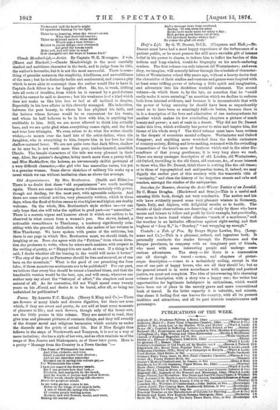Half a Life. By G. W. Dasent, D.C.L. (Chapman and
Hall.)--Hr- Dasent must have had a most happy experience of the forbearance of a patient public, or he must possess the still more enviable gift of intense belief in his power to charm, to induce him to inflict the burden of this tedious and long-winded, would-be biography on his much-enduring readers. The first volume can only interest old Westminsters ; =doyen they, we imagine, will scarcely labour through the schedule of character- istics of Westminster school fifty years ago, without a hearty desire that the chronicler of their studies and customs and games were inspired with at least some trifling power of infusing a little spirit and imagination, and adventure' into his doubtless truthful statement. The second volume—in which there is, by the bye, an assertion that he "conk/ easily make it more amusing," an assertion which we decline to endorse both from internal evidence, and because it is inconceivable that with the power of being amusing he should have been so unpardonably cruel as to have been so amazingly dull—is better, because there is in it a description of the love and admiration of one undergraduate for another which makes its few concluding chapters a picture of much beauty and power; a sort of oasis in a desert. Why did not Dr. Dasent make this love, which evidently has power to raise and inspire him, the theme of his whole story? The third volume must have been written in the despair of conscious mental collapse. Westminster and Oxford disappear, and anything more wretched than the feeble caricature of country society, flirting and love-making, seasoned with the swindling transactions of the hero's man of business which end in the utter dis- comfiture of that young gentleman, it is very long since we read.. There are many passages descriptive of old London, old Westminster, old Oxford, travelling in the old times, old customs, &o., of some interefit to those who, like Dr. Dasent, think there is nothing like the old times.; or to those of topographical and antiquarian tastes, if, indeed, we may dignify the earlier part of this century with the venerable title of "antiquity," and class the history of its forgotten streets and cabs and coaches, amongst the studies of the.antiquarian.






























 Previous page
Previous page